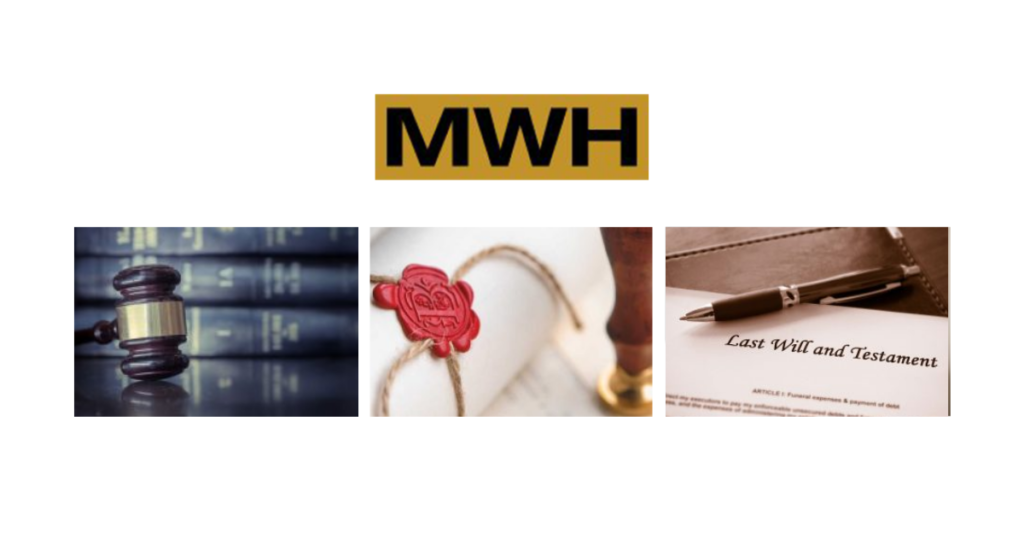Many people underestimate the significance of estate planning, but it is a crucial step to secure your assets and legacy for your loved ones. In this blog post, you will gain valuable insights from estate planning expert Matthew W. Harris. Learn why having a solid estate plan in place is crucial to protect your assets, provide for your family’s future, and ensure your wishes are carried out effectively. Discover the key components of estate planning and the benefits it can bring to you and your family’s financial well-being.
Key Takeaways:
- Estate planning is crucial: It ensures your assets are distributed according to your wishes, minimizes taxes, and can provide for your loved ones after you pass away.
- Benefit of professional guidance: Consulting with an estate planning attorney like Matthew W. Harris can help you navigate the complexities of creating a comprehensive estate plan tailored to your unique needs.
- Regularly review and update your plan: Life circumstances change, so it is important to periodically review and update your estate plan to ensure it reflects your current wishes and financial situation.
The Necessity of Estate Planning
Avoiding Family Conflicts
With proper estate planning, you can avoid family conflicts that may arise after your passing. By clearly outlining your wishes regarding the distribution of your assets, you can prevent misunderstandings and disputes among your loved ones. When you establish a comprehensive estate plan, you provide a roadmap for your family to follow, ensuring that your intentions are carried out without causing rifts or disagreements.
Ensuring Business Continuity
Ensuring the continuity of your business is crucial for its long-term success. Through estate planning, you can designate a successor to take over the operations of your business in the event of your incapacitation or passing. By carefully planning for the future of your business, you can protect its legacy and stability. This involves identifying key individuals who will be responsible for managing the business and outlining a clear succession plan.
Understanding the importance of estate planning for business owners is necessary. Without a thorough plan in place, the future of your business may be uncertain, leading to potential disruptions and conflicts. By taking the time to create a comprehensive estate plan, you can safeguard the continuity of your business and ensure its smooth transition to the next generation or chosen successor.
Key Components of Estate Planning
Wills and Trusts
Estate planning involves several key components to ensure your assets are protected and distributed according to your wishes. Wills and trusts are fundamental tools in estate planning that allow you to specify how you want your assets to be distributed after your passing. A will is a legal document that outlines your wishes regarding the distribution of your property and the care of any minor children. On the other hand, a trust is a fiduciary arrangement that allows a third party, or trustee, to hold assets on behalf of a beneficiary or beneficiaries.
Power of Attorney
On the topic of estate planning, it’s crucial to consider establishing a power of attorney. A power of attorney is a legal document that grants someone you trust the authority to act on your behalf in financial or legal matters if you become incapacitated. This individual, known as your agent or attorney-in-fact, can make decisions such as managing your finances, paying bills, or making healthcare choices if you are unable to do so.
Planning for the unexpected is a critical aspect of estate planning, and having a power of attorney in place can provide you with peace of mind knowing that someone you trust will handle your affairs according to your wishes if you are unable to do so yourself.
Beneficiary Designations
An additional crucial component of estate planning is ensuring that your beneficiary designations are up to date. Beneficiary designations on assets such as life insurance policies, retirement accounts, and investment accounts take precedence over instructions in a will. You must regularly review and update these designations to ensure they align with your current wishes.
For instance, if you have gone through a major life event such as marriage, divorce, or the birth of a child, you should review and update your beneficiary designations to reflect these changes. Failing to update your beneficiary designations can lead to unintended consequences, such as assets being distributed to an ex-spouse or outdated beneficiaries.
Protecting Your Assets
Asset Protection Strategies
For asset protection strategies, there are several options available to safeguard your wealth from potential risks and creditors. Setting up a trust, such as a revocable living trust, can provide a layer of protection by transferring ownership of assets while allowing you to retain control during your lifetime. An irrevocable trust, on the other hand, can offer even more protection as the assets are no longer considered yours, thus shielding them from legal claims.
Minimizing Tax Liabilities
Liabilities: Concerning minimizing tax liabilities, proper estate planning can help reduce the tax burden on your beneficiaries after you pass away. By utilizing tools such as tax-free gifts, charitable trusts, and life insurance, you can strategically plan your estate to minimize the amount of taxes owed. Working with an experienced estate planning attorney like Matthew W. Harris can help you navigate the complexities of tax laws and create a plan that is tax-efficient.
Plus, with the recent changes in tax laws, it’s important to stay informed on how these updates may impact your estate plan. By regularly reviewing and adjusting your plan as needed, you can ensure that you are taking advantage of any tax-saving opportunities and protecting your assets for future generations.
Preserving Family Wealth
One way to preserve family wealth is by implementing a comprehensive estate plan that includes provisions for asset distribution, minimizing taxes, and ensuring your legacy continues for generations to come. By establishing trusts, creating family limited partnerships, and designating beneficiaries for retirement accounts, you can protect your assets and provide for your loved ones according to your wishes.
Another important aspect of preserving family wealth is educating your heirs about financial responsibility and stewardship. By instilling good money management practices and values in your family members, you can help ensure that your legacy endures long after you’re gone.
Planning for Incapacity
Despite your best efforts to stay healthy and active, there may come a time in your life when you are unable to make decisions for yourself. Planning for incapacity is a crucial aspect of estate planning that ensures your wishes are carried out even if you are no longer able to express them.
Advanced Healthcare Directives
- Durable Power of Attorney: This legal document allows you to appoint a trusted individual to make healthcare decisions on your behalf if you are unable to do so.
- Living Will: A living will outlines your preferences for medical treatment and end-of-life care, providing guidance to your healthcare providers and loved ones.
Incapacity can strike suddenly, making it necessary to have plans in place beforehand. Advanced healthcare directives, including a durable power of attorney and a living will, give you control over your medical care even when you cannot communicate your wishes.
Living Wills
Advanced healthcare directives, such as a living will, allow you to specify the type of medical care you wish to receive if you become incapacitated. By outlining your preferences in advance, you can ensure that your healthcare providers and family members understand your wishes and can make decisions accordingly.
Guardianship and Conservatorship
One option for handling incapacity is appointing a guardian or conservator to make decisions on your behalf. A guardian typically handles personal and healthcare decisions, while a conservator manages financial matters. These roles are appointed by a court and come into play when you are unable to make decisions for yourself.
Living wills and advanced healthcare directives are powerful tools that can protect your interests and ensure your wishes are honored in times of need. By creating a comprehensive plan for incapacity, you can have peace of mind knowing that your affairs will be managed according to your desires.
Ensuring Business Succession
Now, as you plan for the future of your business, it’s necessary to consider how you will ensure its smooth transition in the event of unforeseen circumstances. Proper estate planning can help you mitigate risks and protect the legacy you’ve worked so hard to build. Here are some key strategies to consider:
Buy-Sell Agreements
The implementation of a buy-sell agreement is crucial in outlining the terms and conditions under which the business ownership can be transferred. This agreement can help prevent conflicts among co-owners and provide a clear roadmap for the transfer of shares in the event of death, disability, or retirement. By establishing a buy-sell agreement, you can ensure a seamless transition of ownership and safeguard the continuity of your business.
Key Person Insurance
Person key to the success of your business? Key person insurance can protect your company from financial losses that may occur due to the death or disability of a crucial individual within your organization. By securing a key person insurance policy, you can ensure that your business has the financial resources needed to navigate unexpected challenges and continue operations smoothly.
Agreements This type of insurance provides a safety net for your business, enabling you to focus on sustaining operations and maintaining profitability even in the face of adversity.
Family Business Planning
Business Do you own a family business? Family dynamics can add an extra layer of complexity to succession planning. It’s necessary to have a clear strategy in place to address issues such as leadership succession, ownership transfer, and conflict resolution within the family. By creating a comprehensive family business plan, you can establish a framework for the future success of your business and ensure that it remains a source of pride and prosperity for generations to come.
Understanding
the unique challenges and opportunities that come with running a family business is key to developing a sustainable plan that honors your legacy and secures the well-being of your loved ones.
Common Estate Planning Mistakes
Failure to Update Documents
The importance of keeping your estate planning documents up to date cannot be emphasized enough. Circumstances change over time, such as marriage, divorce, births, deaths, and financial fluctuations. Failing to review and revise your will, trust, or beneficiary designations can lead to unintended consequences and result in your assets not being distributed according to your current wishes.
Inadequate Funding
Funding your trust is a crucial step in the estate planning process that is often overlooked. Simply creating a trust is not enough; you must transfer your assets into the trust to ensure they are properly managed and distributed according to your wishes. Without adequate funding, your assets may be subject to probate, potentially leading to delays, additional costs, and lack of privacy in the distribution of your estate.
Inadequately funded trusts defeat the purpose of establishing them in the first place and may not provide the benefits you intended for your loved ones. Ensure that you work with your estate planning attorney to correctly fund your trust and align your assets with your overall plan.
Lack of Communication
Updating your beneficiaries and ensuring that your loved ones are aware of your estate planning decisions is vital for avoiding misunderstandings and disputes in the future. Lack of communication can lead to family conflicts, legal battles, and added stress during an already difficult time. Make sure to discuss your estate plan with your beneficiaries, explain your decisions, and keep them informed of any changes you make along the way.
Plus, maintaining open lines of communication with your estate planning attorney can help ensure that your plan reflects your current intentions and remains in alignment with any changes in laws or regulations that may impact your estate.
To wrap up
Now that you have gained insights from Matthew W. Harris on the importance of estate planning, it is crucial for you to take action and prioritize this imperative aspect of your financial future. By engaging in estate planning, you not only ensure that your assets are properly distributed according to your wishes but also provide security and peace of mind for your loved ones after you are gone.
Do not forget, estate planning is a proactive approach that allows you to make decisions now to protect your assets and your family in the future. Whether you have a large estate or modest assets, creating a comprehensive estate plan tailored to your unique circumstances is a crucial step in securing your legacy and fulfilling your wishes. Take the necessary steps today to start the conversation with your loved ones and seek professional guidance to help you navigate the estate planning process effectively.
FAQ
Q: Why is estate planning important?
A: Estate planning is important because it allows you to specify how your assets will be distributed after your passing. Without a proper plan in place, your assets may end up in probate court, leading to delays, unnecessary expenses, and potential disputes among your heirs.
Q: What documents are important for estate planning?
A: Essential documents for estate planning include a will, a durable power of attorney, a healthcare directive, and possibly a trust. These documents ensure that your wishes are carried out in the event of your incapacity or passing, and they help protect your assets and loved ones.
Q: When should I start estate planning?
A: It is never too early to start estate planning. Regardless of your age or the size of your estate, having a plan in place can provide peace of mind and ensure that your wishes are honored. It is advisable to review and update your estate plan regularly, especially after major life events such as marriage, divorce, or the birth of children.




